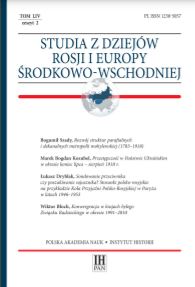Bund w guberni grodzieńskiej podczas rewolucji 1905 roku. Zarys problematyki
The Bund in Grodno Guberniya during the 1905 Revolution: An Outline of Issues
Author(s): Aleksander ŁaniewskiSubject(s): Jewish studies, Political history, Social history, Pre-WW I & WW I (1900 -1919)
Published by: Instytut Historii im. Tadeusza Manteuffla Polskiej Akademii Nauk
Keywords: Bund; 1905 Revolution; Grodno Guberniya; Russian Empire; political practice; Social Democracy; Jews;
Summary/Abstract: During the 1905 Revolution in the Grodno Guberniya, the Bund was the most popular and best organized political party. The Bund, a party composed of Jewish proletariat, small craftsmen and intellectuals, and seeking to overthrow tsarism, not only influenced the consolidation of Jews, but also tried to organize the non-Jewish proletariat, peasants and the army. An analysis of the Bund’s political practice in the Guberniya of Grodno conducted on the basis of archival materials from Grodno and Vilnius, supplemented with memories of participants in events, makes it possible for us to speak of an extremely wide array of both oral and written agitation and propaganda actions undertaken by revolutionaries. In the Grodno region, according to the ideology of social democracy, Bundists established trade unions, participated in electoral campaigns to the State Duma, constantly raising awareness and radicalizing the ‘Jewish street’. Similarly to other regions, in Grodno Guberniya Bund created a new public sphere through a network of party ‘clubs’ (canteens, teahouses) and workers’ ‘exchanges’. During the revolution, the Bund competed, on the one hand, with other political parties (Polish Socialist Party, Social Democracy of the Kingdom of Poland Lithuania, Russian Social Democratic Workers’ Party, Poale-Zion, Socialist Revolutionaries, anarchists), while on the other hand, it was oft en forced to cooperate with them, depending on local conditions. Among the Bund’s usual practices there were not only joint demonstrations and strikes, but also help to political prisoners and participation in self-defence units. At the same time, the party was exposed to constant reprisals on the part of the authorities, to which it responded with revolutionary terror. Despite the recommendations of the party’s leadership, local activists often resorted to economic terror and expropriation. This radicalism resulted from the party’s revolutionary culture, its contacts with maximalists and anarchists popular in the guberniya, and the fact that the significant majority of the party was made up of young people.
Journal: Studia z Dziejów Rosji i Europy Środkowo-Wschodniej
- Issue Year: 54/2019
- Issue No: 2
- Page Range: 65-107
- Page Count: 43
- Language: Polish

